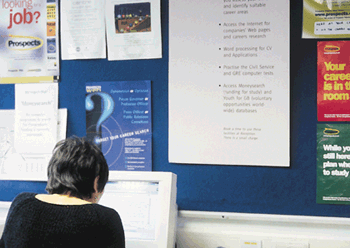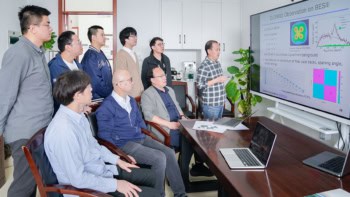Whether you are about to enter the job market for the first time or have been in the workplace for years, many of the same job-hunting skills apply, discovers Valerie Jamieson

So you’ve just entered the final year of your physics degree and you’re starting to feel the pressure. You promise to start job hunting once you’ve done this week’s tutorial problems, written up your project and prepared a presentation on it. Honest! But don’t leave it too late if you want a graduate-trainee job with a blue-chip company warns Elizabeth Wilkinson, an advisor at the University of Manchester and UMIST careers service.
Many large corporations recruit graduates-to-be in October, almost a year in advance. And you could miss out on the wealth of company presentations and interviews that form part of the so-called milkround at many universities. Although jobs are available all year round, it is never too early to think about your future career.
Before you rush out to buy a new suit and print out hundreds of copies of your CV, you first need to think carefully about your interests and needs. Ask yourself what a job has to provide in order to satisfy you, and about the type of environment you would like to work in. The answers will help you to target the types of job you really want, saving you time in the long run.
University careers services have trained advisors who can help you with this process of self-examination, together with computer programs designed to match your interests with a range of occupations. Careers services also provide a wealth of information about different employers and occupations. Many universities make these resources available to researchers employed on short-term contracts, as well as students.
Once you have identified the types of jobs to go for, you’ll need to prepare a résumé. Your CV is often the first impression a prospective employer gets so it is worth spending time making sure it is right. It has to impress an employer at a glance and it has to emphasize your achievements. First identify your key strengths and draw up a list of your talents, including your technical skills and any foreign languages.
A quick look at any job advert reveals that employers are also looking for transferable skills, such as team-work, leadership and communication. According to John Kirwan of Oxford University’s career service, many physicists are unaware of the transferable skills they possess. Your degree demonstrates that you are numerate and have the ability to solve problems, handle data and communicate results. Meanwhile, project work can demonstrate a host of skills from decision making to time management and organizational skills. And if you are a post-doc with experience in teaching and supervising students, you can tick off almost every transferable skill sought by employers.
It is also worth looking beyond your course work. But can working in a bar or being treasurer of the science-fiction society really help your job prospects? “If you are applying for a scientific job then relevant work experience does help,” says Wilkinson at Manchester. “But don’t panic if you don’t have any.” The key is to think broadly. Many student jobs require you to deal with the public – be it over the bar or over the phone – and can be used as evidence of communication skills and commercial awareness. Even role-playing games like Dungeons and Dragons show creativity, planning and problem-solving skills. “Many physics students who repair their own computers forget to mention it on their CVs,” adds Wilkinson. “It is exactly the sort of technical skill that impresses employers.”
Get noticed
You may be heading for a good degree and have a host of transferable skills but so do many other job applicants. How do you make your CV stand out from the crowd? “Put yourself in the shoes of the recruiter,” advises Kirwan, “and ask what you would look for.” Many companies receive hundreds of applications for each job, with recruiters spending only a few minutes reading each CV. So keep it short – two pages at the most – and highlight your skills near the top. Simple things, like listing your achievements or previous appointments in reverse chronology, are effective. And avoid citing all your publications or going into detail about your thesis. “Make an effort to link your CV to the job that is on offer, rather than sending a generic one,” says Victoria Notley, a personnel officer at Sharp Labs of Europe.
Careers fairs and company presentations also give you the ideal opportunity to meet employers and employees in informal surroundings. “Don’t just listen to the presentation and scoff the food before leaving,” says Wilkinson. “Go equipped with some questions and be prepared to engage prospective employers in dialogue. Talk to human-resource managers to gain an insight into the recruitment process. Also try to catch recent graduates off guard to ask them what it is really like to work for the company.”
Like your CV, your covering letter gives you another chance to sell yourself and express your enthusiasm for the job. You can also use the letter to address any mismatches between your skills or experience and the job advert.
Preparation is what you need
Once you have been shortlisted for the job, the next stage is the interview. Interviews come in all shapes and sizes, ranging from a short chat with the boss to a formal grilling by a panel, followed by assessments and group exercises. In all cases, the key to success is in the preparation. Look at the company’s Web site, read its literature and visit a careers service that has an up-to-date file on the firm. After all, knowledge of the company’s products, culture and history shows that you are a serious candidate.
Make sure you have thought about why you want the job and why you want to work for that particular company. Interviewers are likely to ask you about your strengths, your weaknesses and, if you are a post-doc, why you want to leave academia.
Physicists and engineers tend to undersell themselves, according to Wilkinson. If you go into an interview thinking that you are defeated then you will be, she says. So prepare answers that sound positive, mention strengths that fit well with what you think the company is looking for and give examples from your life or work to back up your claims. Similarly, don’t point out weaknesses that are essential to the job.
Another tip is to smile when you enter the interview room and be aware of your body language. “It is hard when you are nervous,” says Wilkinson, “but most employers want to hire someone that they can talk to at the coffee machine.”
Finding a Job is available from the Institute of Physics, e-mail physics@iop.org



